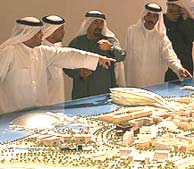
Where’s the car park?
The rulers of UAE know better than most that the world’s oil supplies are running out. That’s why they committed $37 billion to build a city that is totally self sufficient for energy and water, plus a range of other alternative energy projects in the desert outside their capital of Abu Dhabi.
Residents are due to start moving in next year, but is it greenwash? The architects, Foster and Partners, are not known for their environmental credentials, and it is likely that the city will simply be a monument to greed and delusion, if it is ever finished. The premise of its designers is that if they can just tweak the system, make it more efficient, then we can go on consuming just as much as we ever did.
A key part of the plan is actually to produce even more oil than at present, through an inventive use of carbon sequestration. The city, to be named Masdar and first established in 2006, is working with state-owned Abu Dhabi National Oil Co. � which produces virtually all of the emirate’s 2.5 million barrels of crude per day � to identify oil fields that would benefit from carbon injection to enhance oil recovery, reports the Toronto Globe and Mail.
Abu Dhabi is planning to invest up to $4-billion to capture as much as 15 million tonnes of CO2 annually from eight industrial plants, and then inject the gas underground to enhance oil recovery in the area.
Once injected, it is hoped that the greenhouse gas will remain sequestered underground indefinitely, but there is little in the way of a guarantee.
On the positive side, Masdar’s planned 25,000 homes will be a showcase for eco-techniques — albeit ones best pioneered in less grandiose settings. By blending waste management with renewable technologies such as solar and wind power, Masdar will use 75 per cent less electricity and less than half the amount of water of conventional cities, saving the equivalent of $2bn in oil costs over 25 years, its claimed. Car use will be highly restricted and set behind walls to divert hot desert winds and airport noise. Water will flow from a solar-powered seawater-desalinization plant. Produce will come from nearby greenhouses, and all waste will be composted or otherwise recycled, said Khaled Awad, property manager for the project.
The city itself is budgeted at $22b and $15b will go to solar and hydrogen power plants and solar panel manufacturing sites outside Masdar.
As one of the world’s most prolific oil producers, Abu Dhabi is also a major emitter of greenhouse gases � third in the world on a per capita basis after neighbours Qatar and Kuwait.
In addition to the revenue generated by replacing the natural gas that is currently used to enhance oil production, the company behind Masdar will profit from the sale of emission credits generated by the reduction in greenhouse gases.